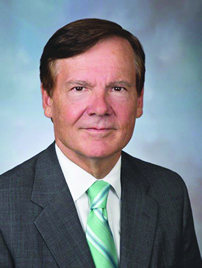It may seem like political influence is all about money, but a former U.S. lawmaker says that ACR members can make their voices heard in the legislative process by building personal relationships with elected officials.

Tim Hutchinson will outline that approach in the Tuesday afternoon Advocacy Training: How-to From a U.S. Senator and the New Age of Digital Advocacy ACR clinical symposium.
A senior director in the Washington, D.C., office of the law firm of Greenberg Traurig, Hutchinson represented Arkansas for one term in the Senate and for two terms in the House of Representatives. He started his legislative career as an Arkansas state representative in 1985.
Stressing what he called the “imperative of political engagement,” Hutchinson said a most important element is meeting with the local state representative and buttonholing the local lawmaker when he or she returns to the district. Physicians also should consider volunteering to campaign for a candidate they believe in.
“It doesn’t cost any money at all,” Hutchinson said. “It costs a little bit of time, but it is establishing the friendship and the relationship that will make you the go-to person when they have questions about issues that impact what you are doing.”
While in Congress, Hutchinson was the chief Senate sponsor of legislation creating Association Health Plans, served on the conference committee that hammered out Patient’s Bill of Rights legislation, and co-sponsored legislation addressing the nation’s nursing shortage. He also formed the Senate Biotechnology Caucus. In the House, he chaired the Veterans Affairs Subcommittee on Health, which has jurisdiction over one of the largest hospital and health care delivery systems in the nation.
Hutchinson expects to brief ACR members on some of the big issues facing rheumatologists and the medical community as a whole.
One of those issues is the increasing cost of prescription drugs and the fact that many patients are losing access to life-changing biologics as insurance companies place them into a special tier in their formulary where the patient pays a percentage of the cost instead of a co-pay. The charges range from 15 percent to 50 percent, Hutchinson said.
He noted that ACR worked hard to help form the Coalition for Accessible Treatments, which includes about two dozen health care organizations, to advocate for what Hutchinson said was a rational and reasonable approach for insurance companies to handle breakthrough drugs for treatment of rheumatoid conditions as well as other diseases, including cancer.
The coalition favors the federal Patients’ Access to Treatment Act, he said, which would prohibit health plans from imposing cost-sharing requirements, including co-payment and co-insurance, applicable to prescription drugs in a specialty drug tier that exceed the dollar amount of cost-sharing requirements applicable to prescription drugs in a non-preferred brand drug tier.
Another broad area of concern for ACR and other medical groups, Hutchinson said, is the continued impact from wide-ranging, automatic spending cuts — known as sequestration — on funding for medical research.
He noted that most of the biologics that have had such a dramatic impact on treatment have emerged during the last 10 to 15 years from medical research.
On the political front, Hutchinson said he expected to shed some light on the forces that seem to be driving support for 2016 presidential candidates considered to be outside of the mainstream, such as Republican Donald Trump and Democrat Bernie Sanders.
Hutchinson said a large part of the voter frustration driving those candidates stems from the gridlock and hyper-partisanship in Congress, which he said stems from gerrymandering of highly partisan districts throughout the country.
Given that government at all levels has such a significant impact on health care today, Hutchinson said it was his mission to broaden the involvement of the ACR membership in governmental affairs.
“Doctors have often had the attitude that, ‘I am going to take care of my patients and we will leave public policy to good, civically minded people who have time to invest in that,’” he said. “That is one reason their voice has not been heard oftentimes.”
